To prevail in the unfolding ideological war with China that now stretches before them will require a radical reembrace of liberal-democratic principles by the West’s leaders, says a leading commentator.
Xi Jinping’s Marxist nationalism is an ideological blueprint for the future; it is the truth about China that is hiding in plain sight, argues Kevin Rudd, head of the Asia Society and a former Prime Minister of Australia. Under Xi, the CCP will evaluate changing international circumstances through the prism of dialectical analysis—and not necessarily in ways that will make sense to outsiders, he writes for Foreign Affairs:
For example, Xi will see new Western institutions intended to balance against China, such as the Quad (the Quadrilateral Security Dialogue, a strategic cooperation agreement between Australia, India, Japan, and the United States) and the AUKUS (a defense agreement linking Australia, the United Kingdom, and the United States), as both strategically hostile and ideologically predictable, requiring new forms of political, ideological, and military “struggle” to roll back. In his Marxist-Leninist view, China’s ultimate victory is guaranteed because the deep forces of historical determinism are on the CCP’s side, and the West is in structural decline.
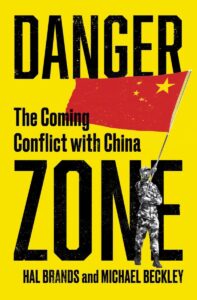 Whatever may unfold, Xi will not abandon his ideology. He is a true believer. And this presents one further test for the United States and its allies, Rudd adds. To prevail in the unfolding ideological war that now stretches before them will require a radical reembrace of the principles that distinguish liberal-democratic political systems.
Whatever may unfold, Xi will not abandon his ideology. He is a true believer. And this presents one further test for the United States and its allies, Rudd adds. To prevail in the unfolding ideological war that now stretches before them will require a radical reembrace of the principles that distinguish liberal-democratic political systems.
The Hoover Project on China’s Global Sharp Power and the Stanford Center for International Security and Cooperation hosts a talk titled Danger Zone: The Coming Conflict with China, featuring Journal of Democracy founding co-editor Larry Diamond and Forum author Glen Tiffert (above).
Over the past decade, Xi has preached China’s autocracy as a “new option for other countries who want to speed up their development” while overseeing policy blunders that undermine global prosperity, TIME’s Charlie Campbell writes:
Xi’s deepening demagoguery signals an entrenched superpower rivalry and cascading hazards for all those who depend on China’s $17.7 trillion economy….. All this sets the stage for a new Cold War, one that threatens to be even more devastating because of economic interdependence. Never before in human history has the global economy—and the livelihoods of so many billions—been so at the whim of one man.
“The future is bright for Xi Jinping,” says professor Steve Tsang, director of the SOAS China Institute at the University of London, “and dark for everybody else.”
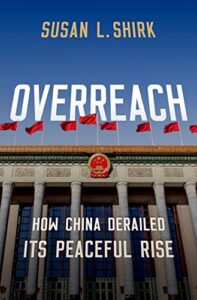 “Xi’s anticorruption campaign was a party ratification drive to remove people who are not loyal to the top leader,” says Tsang. It augured a seismic shift in Chinese governance:
“Xi’s anticorruption campaign was a party ratification drive to remove people who are not loyal to the top leader,” says Tsang. It augured a seismic shift in Chinese governance:
China had long relied on a robust bureaucracy, and Deng codified the separation of party and state to handle policy and implementation respectively. But under Xi, the two have morphed into one. In 2019, Xi even changed the CCP’s evaluating criteria for leading cadres so that the very first is commitment to his eponymous political thought—gnawing away at the professionalism of governance.
“In the past, everyone took for granted that the Chinese leadership is going to make the adjustments it needs to make to keep its economy humming,” says Susan Shirk, a Deputy Assistant Secretary of State for East Asian and Pacific Affairs under Bill Clinton, and author of Overreach: How China Derailed Its Peaceful Rise. “But now they’re overreaching and harming their own economic development.”
Putin’s Russia is “a disrupter” that is “unpredictable in its actions at the moment,” but it is China which could present Western democracies with a “sliding-doors moment in history,” in which the United States and its allies may soon discover that they are too far behind in a series of critical technologies to maintain a military or technological edge over Beijing, according to a senior British intelligence official.
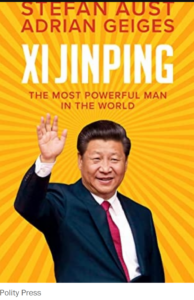 Jeremy Fleming, who heads GCHQ — the British electronic intelligence-gathering and cyber agency – described China’s move to develop central bank digital currencies that could be used to track transactions as a shift that could also “enable China to partially evade the sort of international sanctions currently being applied to Putin’s regime in Russia,” the New York Times reports. He said that was one example of how China was “learning the lessons” from the war in Ukraine, presumably to apply them if it decided to move against Taiwan and prompted further efforts by the U.S. and its allies to isolate it economically.
Jeremy Fleming, who heads GCHQ — the British electronic intelligence-gathering and cyber agency – described China’s move to develop central bank digital currencies that could be used to track transactions as a shift that could also “enable China to partially evade the sort of international sanctions currently being applied to Putin’s regime in Russia,” the New York Times reports. He said that was one example of how China was “learning the lessons” from the war in Ukraine, presumably to apply them if it decided to move against Taiwan and prompted further efforts by the U.S. and its allies to isolate it economically.
Over the past decade, Xi Jinping’s regime has conducted brutal assimilationist campaigns with especially grim consequences for Tibetans, Uyghurs, people in Hong Kong, and others, notes Sophie Richardson, the China director at Human Rights Watch.
He has reengineered the party state, reversing previous decades of slow progress toward legal reform. From the 2016 counterterrorism law to the 2017 Foreign Nongovernmental Organization Activities in China law to the Orwellian 2020 “national security” law imposed on Hong Kong, Xi’s entourage has used the law to entrench party power, she writes for the Washington Post:
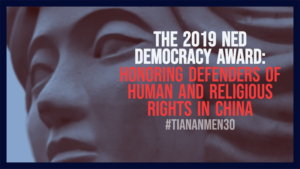 Xi has had a decade to show his true human rights colors. From crimes against humanity to the abusive “zero-covid” policies to an unwillingness to condemn Russia for war crimes in Ukraine, the outcome is far bleaker than most predicted. The costs of allowing these trends to go unchecked into the future should motivate action now. Democracies should move swiftly to defend human rights inside and outside China.
Xi has had a decade to show his true human rights colors. From crimes against humanity to the abusive “zero-covid” policies to an unwillingness to condemn Russia for war crimes in Ukraine, the outcome is far bleaker than most predicted. The costs of allowing these trends to go unchecked into the future should motivate action now. Democracies should move swiftly to defend human rights inside and outside China.
Has China’s lack of political reform held back genuine economic reform? This is one of many questions Hong Kong University’s Frank Dikötter answers Democracy Paradox in a conversation about China’s history after the death of Mao.
Ahead of China’s 20th Party Congress, where Xi Jinping is poised to further consolidate power, the NED’s International Forum features a selection of publications to contextualize the Chinese authorities’ efforts to influence foreign societies and reform global governance.

National Endowment for Democracy (NED)
China’s Confucius Institutes are engaged in a wide variety of activity beyond their supposed remit of ‘language and culture’, says a new investigative report from the Henry Jackson Society. These activities range from co-operating with groups adjacent to the CCP’s United Front Work Department, to setting up sensitive science and technology partnerships with China, from offering commercial services including acupuncture sessions and business consultancy, to making political donations and staging events in Parliament, note authors Sam Dunning and Anson Kwong.
Confucius Institutes are unlike other ‘soft power’ initiatives such as the British Council. Their position within universities gives Confucius Institutes license to trade on prestigious reputations. It allows them to diversify their activity with minimal supervision, adds the report.
Above all, it enables them to win influence and shape narratives inside the academy, poisoning the well of academic knowledge about China and deepening the higher education sector’s dependency on the country. The difference in values between the CCP and the Western academy are so great as to make genuine partnerships between the two entirely unsustainable.
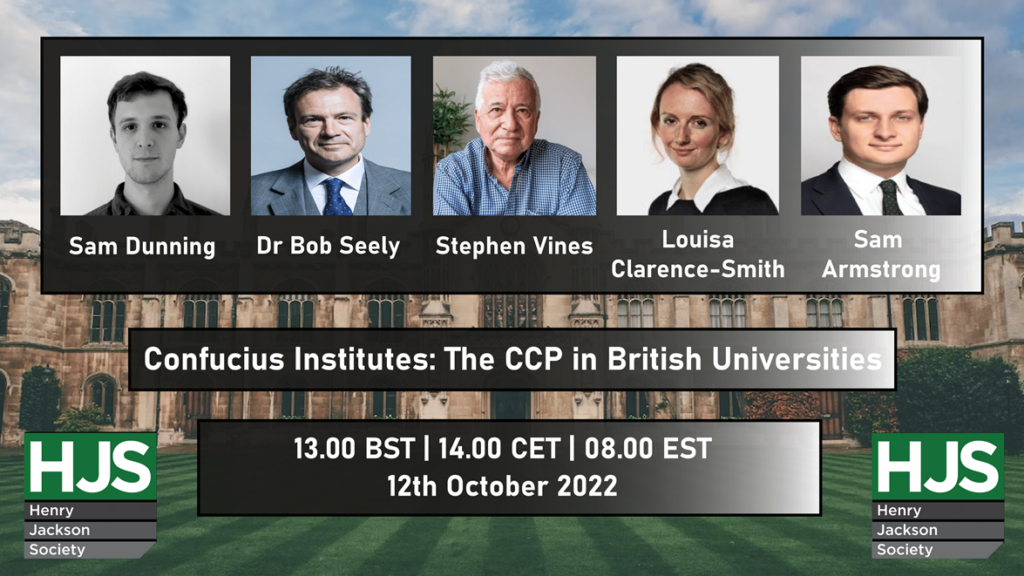
SPEAKERS:
Sam Dunning, Co-author of the Henry Jackson Society’s report, “The Long Hand of Academic Oppression How the CCP uses Confucius Institutes in the UK”
Dr Bob Seely, Member, House of Commons Foreign Affairs Select Committee
Stephen Vines, Journalist, writer and broadcaster, author of the book, “Defying the Dragon: Hong Kong and the Worlds’ Largest Dictatorship”
Louisa Clarence-Smith, Education Editor, The Telegraph RSVP
Japan has much to learn from Taiwan’s countering what the @ThinkDemocracy calls #China’s #sharppower https://t.co/8iPs4AyASO
— Democracy Digest (@demdigest) October 11, 2022







